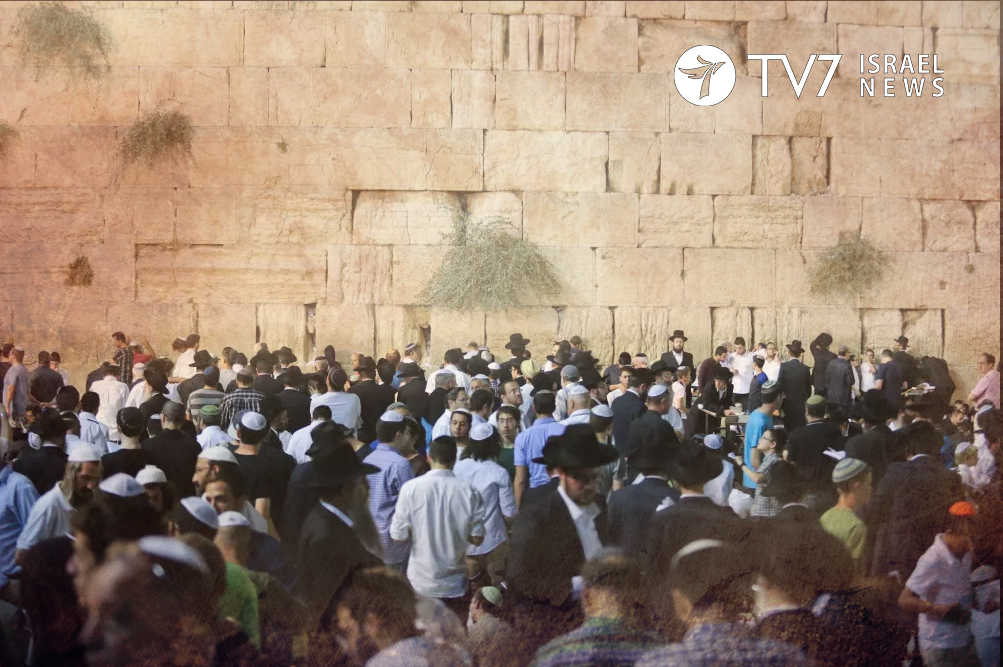Amid high tension surrounding the Temple Mount, Jews commemorated yesterday the destruction of both biblical Temples with the annual Tisha B’Av fast. Despite the severe clashes that followed a terror attack last month in which two Israeli police officers were murdered at the antient site, over 1,000 Jews visited the mount, which was recorded as a record number in one day since Israel conquered the compound in 1967, doubling the number of visitors from last year. Police told TV7 that the day passed relatively quietly, with no exceptional incidents. That said, Israel’s chief Rabbi Yitzhak Yosef voiced a position against Jews visiting the Temple Mount, stressing that according to Jewish religious law, Halacha, “visiting the Temple Mount is forbidden,” alleging that “The Jews who visit the Temple Mount are violating its sanctity.” It is important to note that the position of Israel’s chief rabbi is that of the Ultra-Orthodox stream, and does not take into account other streams of Judaism who aspire to worship at the antient site, revered by Jews as their holiest site, yet are forbidden to do so, due to the safeguarded status quo that permits only Muslims to worship there.
 Jordanian Foreign Minister Ayman Safadi, who spoke at a conference of foreign ministers from 45 Islamic countries in the Turkish city of Istanbul, warned of the consequences of Jewish visits to the Temple Mount, saying it was a continuation of Israel’s violation of the status quo at the holy site. The Jordanian top diplomat said in his address that “One crisis has ended, but many and more dangerous crises might erupt due to Israel’s ongoing violations, such as the one we witnessed today.” “My dear brothers. Jerusalem is an Arab, Islamic holy site. It is above all politics and massing in it is a provocation to Muslims all over the world. Instead of gambling with the security of the region and with the right of the people to live safely and in stability, Israel should work on achieving peace that leads to the establishment of the independent Palestinian state, with East Jerusalem as its capital,” the Jordanian top diplomat told the conference.
Jordanian Foreign Minister Ayman Safadi, who spoke at a conference of foreign ministers from 45 Islamic countries in the Turkish city of Istanbul, warned of the consequences of Jewish visits to the Temple Mount, saying it was a continuation of Israel’s violation of the status quo at the holy site. The Jordanian top diplomat said in his address that “One crisis has ended, but many and more dangerous crises might erupt due to Israel’s ongoing violations, such as the one we witnessed today.” “My dear brothers. Jerusalem is an Arab, Islamic holy site. It is above all politics and massing in it is a provocation to Muslims all over the world. Instead of gambling with the security of the region and with the right of the people to live safely and in stability, Israel should work on achieving peace that leads to the establishment of the independent Palestinian state, with East Jerusalem as its capital,” the Jordanian top diplomat told the conference.
Safadi’s reference to Jewish visits as a violation is in direct contrast to the peace treaty with Israel, which clearly states in article 9 – quote – “Each party will provide freedom of access to places of religious and historical significance,” and ” will act together to promote interfaith relations among the three monotheistic religions, with the aim of working towards religious understanding, moral commitment, freedom of religious worship, and tolerance and peace.”
 Meanwhile, Palestinian Foreign Minister Riyad al-Maliki, used the stage of the Organization of Islamic Cooperation conference, to urge the Muslim world to prepare for a new round of what he referred to as “nasty” actions by Israel. “We know that Netanyahu is not going to accept defeat and he will try again and again with different methods and different means to impose his own status-quo over the Haram al-Sharif (Temple Mount) and al-Quds (Jerusalem). We have to be prepared for the next round which could come very soon and could be very nasty,” Al Maliki declared.
Meanwhile, Palestinian Foreign Minister Riyad al-Maliki, used the stage of the Organization of Islamic Cooperation conference, to urge the Muslim world to prepare for a new round of what he referred to as “nasty” actions by Israel. “We know that Netanyahu is not going to accept defeat and he will try again and again with different methods and different means to impose his own status-quo over the Haram al-Sharif (Temple Mount) and al-Quds (Jerusalem). We have to be prepared for the next round which could come very soon and could be very nasty,” Al Maliki declared.
The condemning statements by the Muslim world at Israel’s security measures, which were implemented after the deadly terror attack last month, which claimed the lives of two police officers, came as a surprise in Washington. US President Donald Trump’s senior advisor Jared Kushner said, on a recording leaked to the American WIRED magazine, that “logical measures taken, somehow became a little bit incendiary,” referring to the illogical response by the Muslim world, which perceived the move as an attempt by Israel to assert full sovereignty over the Temple Mount, where Islam’s third holiest site, the Al-Aqsa Mosque, is located. Trump’s senior advisor and son-in-law continued by expressing doubt that the US Administration could find a “unique” solution that would ultimately lead to a viable peace agreement between Israel and the Palestinians; while pointing to the fact that over the course of the last 40 or 50 years, the international community was not able to do “a whole lot” in establishing true prospects of ending the conflict. Nevertheless, Kushner emphasized that even though “there may be no solution,” President Trump is keen on exhausting all options for peace and that is why his team will “focus on it and try to come to the right conclusion in the near future.”
